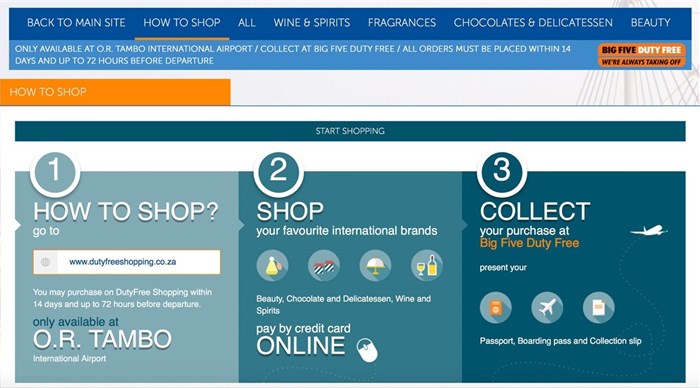
Top stories






AutomotiveHilux Custom Builds offers purpose-built solutions for your business
Toyota South Africa Motors 16 Feb 2026
More news


Marketing & Media
Ads are coming to AI. Does that really have to be such a bad thing?














Shethal Badal: As with any commercial drive, it’s key to identify your target market. In the e-commerce space, our research showed that the major users were Millennials (21-34) and Generation X (35-49). That gave us a path to follow with regard to the design and user experience of Duty Free Shopping.
Mobile compatibility is also important for those market segments. From there onwards, everything was driven by the offering itself – finding a good product mix at competitive prices, offering users the opportunity to compare prices, search across retail platforms by category and then offer specials, savings or exclusive product packages.
Local products are also important for our e-commerce offering – we wanted to provide people with the opportunity to take a piece of Africa home with them. Adding a currency converter added to the ease of use for our international visitors. Topping the offering off with a variety of secure payment options was important too. We use the Setcom payment gateway, which is fully compliant with the highest global payment industry security standards.
Badal: According to research in South Africa, 38% of shoppers use mobile devices for banking, while 23% use mobile for online purchases. Just over 4% purchase something online weekly and 16% shop online, monthly. Of those users, over 9% spend more than R2,000 per month in online shopping, making it a lucrative area with potential for growth.
It’s hard to predict how people will engage with online shopping when they’re travelling, so we’ve attempted to make it as easy as possible for them. Duty Free Shopping allows shoppers to select and pay for their products online, and then simply collect them at a dedicated point within the main Big Five Duty Free store at O.R. Tambo International Airport. Simplicity, ease of use and convenience are key – and those are the three elements that the most successful e-commerce portals have gotten right.

Badal: The duty-free environment comes with many rules that don’t apply to other online retail sites. For example, although one can purchase from many stores and make one payment online when collecting at the airport, the collection has to be per store and cannot be one collection point for multiple stores.
Also, because different countries have different customs and volume allowances, this needs to be communicated to consumers/travellers to make sure that they do not exceed their limits and have their purchases confiscated on arrival. ACSA has worked hard to fine tune this process to make it as easy as possible for shoppers. ACSA only manage the process on behalf of our concessionaires and do not actually own the stores on our properties or the goods which are made available for sale.
Badal: We have to manage our internal objectives but, at the same time, deliver on passenger expectations on a global level. That is why we have started with a small product base on Duty Free Shopping and will look to expand the scope as things progress. A good product mix is important in the e-commerce environment – shoppers expect to find tremendous variety online, and that’s something we’re working towards.
Pricing also needs to be competitive in the e-commerce space, since many online retailers are able to offer substantial discounts on the back of not having to sustain physical retail environments. The ability to offer a variety of payment methods is also important when dealing with visitors from all over the world.
Our team is working hard to grow and maintain tenant participation while keeping the Duty Free Shopping portal top of mind with travellers.
Badal: For ACSA, e-commerce adds a new dimension in choice and convenience to our travellers as well as making sure we, at the very least, keep up with world standards in terms of the offering travellers what they expect. Duty Free Shopping is a portal for showcasing our Duty Free Mall’s exclusive product offering to global travellers, at special online-only pricing.

Badal: The process of developing a duty-free shopping platform is more complex than any normal e-commerce platform due to the legislation around duty-free purchases. These products can only be purchased when you travel, which limits the opportunity for purchases. Collection of the products must be upon departure, on the day of your travels, and all purchases have to fit within the customs limitations for the traveller’s final destination.
Duty Free Shopping has to integrate with more than one retailer at O.R. Tambo International Airport and allow the traveller to make one payment, irrespective of the number of stores that supply the products they have purchased. Legislation dictates that in the event that the products selected come from multiple retailers, those purchases must be collected from the retailer that supplied the product – so there cannot be one central collection area.
Duty-free stock needs to be allocated specifically for online shoppers and these items must be prepared and packed, ready for collection on the day of the traveller’s departure. A dedicated collection point has to be clearly marked in-store for ease of collection, for online shoppers only.
Badal: ACSA’s airport properties regularly feature at the top of international airport ratings for service, access and convenience. Adding an e-commerce offering for our international travellers was a natural evolutionary step and keeps our airports’ offering in line with other top airports around the world.
Offering an e-commerce portal also makes for an easier shopping experience for travellers. Any modern retailer needs to have a quality online offering, and a portal like Duty Free Shopping fulfils that requirement for ACSA and its concessionaires. The portal improves our retailers’ reach and offers travellers a convenient way to shop for gifts and travel mementoes at competitive prices, and in their own time.
